Two seasons later Dzurilla made his international debut for the Czechoslovakia National Team at the 1963 World Championships where he played in four of their seven games to earn his first medal, a bronze.
In the following season of 1963-64, Dzurilla continued his career with Slovan Bratislava, finishing second for the third time in his four seasons. He then made his Olympic debut at the 1964 Games in Innsbruck, Austria, playing in two games and earning his first Olympic medal, again a bronze.
Another runner-up finish with Bratislava was followed by another appearance at the 1965 World Championships, where Dzurilla played in five games with a 1.26 goals against average and a silver medal behind the dominant Soviet Union. Dzurilla was named to the tournament All-Star Team and was recognized as the tournament's Best Goaltender.
1965-66 was another season with Slovan Bratislava, where the club came home third for the second time in his career, the other being 1962-63. He then earned a second silver medal at the 1966 World Championships in Ljubljana, Yugoslavia.
Injury curtailed his 1966-67 season, with just 9 games played in the Czechoslovakia Extraliga, but Dzurilla bounced back in fine style with a new career best goals against average of 2.47 in 1967-68 which earned him a second trip to the Olympic Games. He was limited to just one game in Grenoble, France, but the team took second place to earn the silver medal.
The 1968-69 season saw another season with Slovan and a goals against under 3.00 at 2.91 and another third place in the league. The 1969 World Championships were a politically charged affair following the Soviet Union's invasion of Czechoslovakia in August of 1968 following the Prague Spring, a period of liberalization and greater freedoms in Czechoslovakia under Alexander Dubček.
The 1969 World Championships were originally scheduled to be held in Prauge, but were relocated to Stockholm, Sweden due to the ongoing invasion in Czechoslovakia.
Overcome by a vicarious sense of triumph, a huge and excited crowd swarmed into Prague’s Wenceslas Square. One happy hockey fan carried a poster that read BREZHNEV 3, DUBČEK 4. The crowd chanted, “We’ve beaten you this time!” Someone shouted, “The Russian coach will go to Siberia!”
For the 1969-70 season, Slovan Bratislava earned yet another second place finish in the Extraliga behind Dzurilla's career best 2.15 goals against average in 34 games played, which was his career high at the time. Later that season Dzurilla would earn his third World Championship bronze medal.
The 1970-71 season would be a limited one for Dzurilla, seeing action in just 19 games and would not compete in the World Championships for only the second time in his career, the other being 1967.
He would make up for it with a busy 1971-72 season, as he would play 29 games of Bratislava's regular season, capped off with Slovan's second place finish yet again, the fifth of his 12 years with the club.
Internationally, Dzurilla competed in his second Olympic Games in Sapporo, Japan where he earned his third Olympic medal and second bronze.
1972 also marked the first time that the World Championships were played separately in the same year as the Olympics, and were held in Prague for the first time since 1959, thanks to their relocation three years earlier due to the Soviet invasion.
The Czechs opened the tournament in dominating fashion, defeating Switzerland 19-1 and then scored wins against Sweden (4-1) and West Germany (8-1) before crafting a 3-3 tie against the Soviets. They then reeled off wins against Finland (5-3), Switzerland (12-2), Sweden (2-0), West Germany (8-1), the Soviet Union (3-2) and finally Finland (8-2) to not only earn the first gold medal of Dzurilla's career, but just the third the history of Czechoslovakia and first since 1949. There was also a certain level of satisfaction in being the ones to end the ten consecutive World Championship and Olympic gold medal streak of the Soviets which dated back to 1963.
Dzurilla would play his 13th and final season for Slovan Bratislava in 1972-73, which included Slovan would traveling to Switzerland, where Dzurilla and the team would win the annual Spengler Cup tournament.
He would then move to HC Kometa Brno for the next five seasons, from 1973-74 through 1977-78. During that time period, Dzurilla would return to the World Championships for the first time since 1972's gold medal winning team. And it was a successful return as the Czechs again captured the gold in Katowice, Poland with a perfect 7-0 record for the second gold medal of Dzurilla's career.
Later that year he gained his first real exposure to North Americans when he competed in the 1976 Canada Cup tournament with a strong performance, posting a 2.36 goals against playing in all five games for the Czechs, which saw them open with a 5-3 win over the Soviet Union followed by an 8-0 pounding of Finland. A 4-4 tie with a scrappy United States was followed by a stunning 1-0 shutout over Canada in front of a sold out Forum in Montreal and millions watching on television, which cemented Dzurilla's legacy as a stellar international goaltender in what many immediately called one of the greatest games of all time.
While the Czechs lost to Sweden 2-1 in their final round robin game, they still advanced to the best-of-two final against Canada, where the Canadians chased him from the nets with four goals in the first period of Game 1. After Jiří Holeček let in two goals in the first 3:09, Dzurilla came in and held the Canadians to one power play goal as the Czechs stormed back to take the lead 4-3 with four minutes remaining only to see Canada tie the game with just 2:12 left in regulation when Dzurilla sent a clearing attempt right to Canada's Bill Barber, who buried the puck into the unattended goal.
The game would then go to overtime with both Dzurilla and Rogie Vachon making great saves at either end before Canada would take the title with a goal 11:33 into overtime with Dzurilla recording 29 saves in over 68 minutes of relief.
Following the 1976-77 regular season, Dzurilla would close out his international career in fine style, playing seven of the Czechs ten games with a 2.70 goals against average. The Czechs would defeat the Soviet Union and Sweden in the Final Round to defend their championship from the previous year thanks to a 7-2-1 record, one point better than Sweden and the Soviet Union at 7-3 thanks to their 3-3 tie against Canada earlier in the competition.
Dzurilla would play one final season in Czechoslovakia for Brno, which included traveling to North America to backstop the Czechs during their games against teams from the World Hockey Association which unusually counted in the WHA regular season standings.
From there, Dzurilla would spend the final four seasons of his 22 year career in Germany, first for Augsburger EV (Augsburger Panthers) in 1978-79 and then three seasons with SC Riessersee, which saw him named Germany's Best Goaltender in both 1980 and 1981.
Today's featured jersey is a 1976 Czechoslovakia Vladimír Dzurilla jersey as worn in the 1976 Canada Cup when Dzurilla shutout Canada in Montreal in a dramatic 1-0 win, considered one of hockey's greatest games.
This particular jersey wound up in the possession of Canada's goaltender Vachon when the teams traded jerseys after the contest in the European tradition.
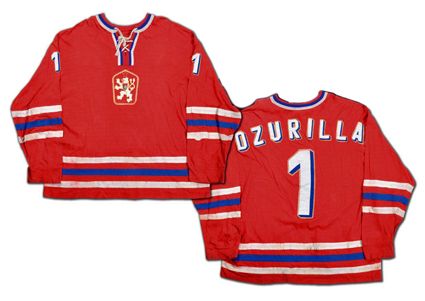
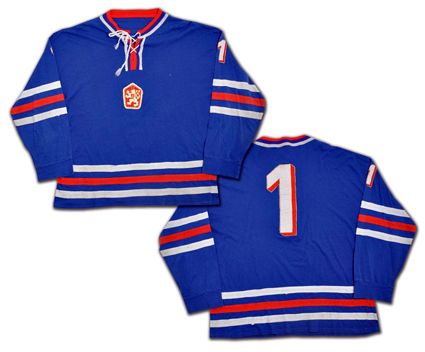
Here is a special treat, footage of Czechoslovakia beating the Soviet Union at the 1969 World Championships, showing footage from the game as well as the heroes welcome they received when they returned home.

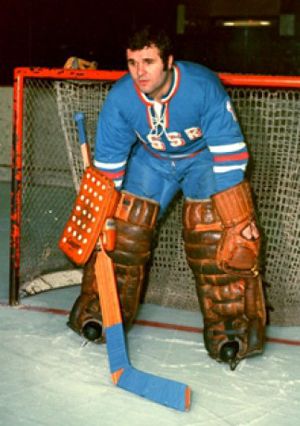
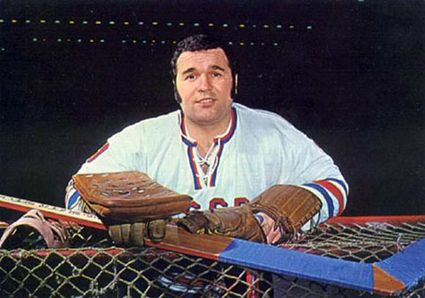
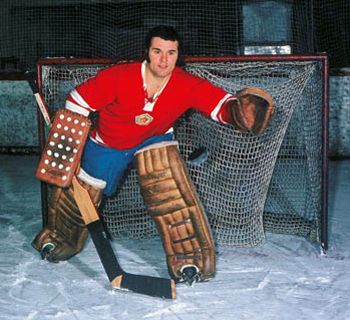
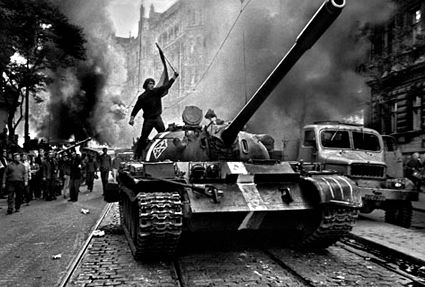
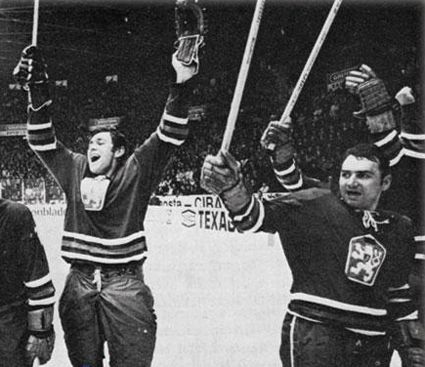
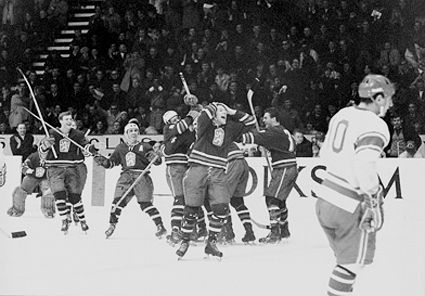
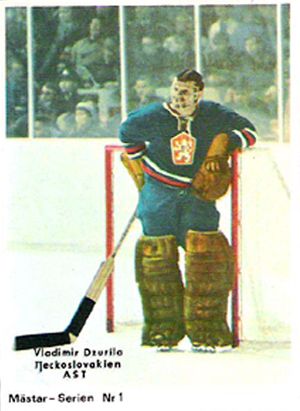
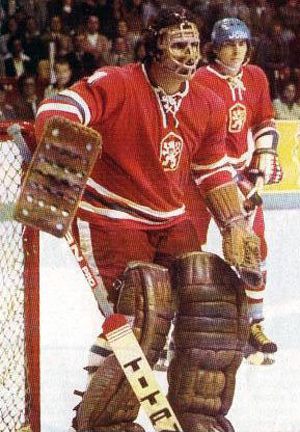
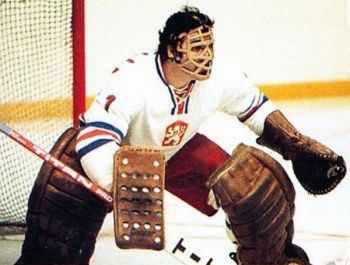
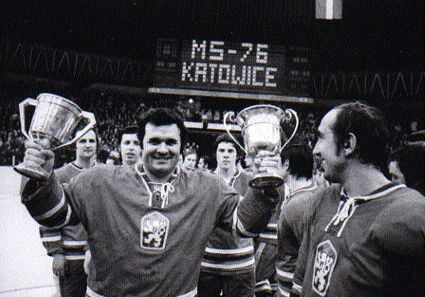
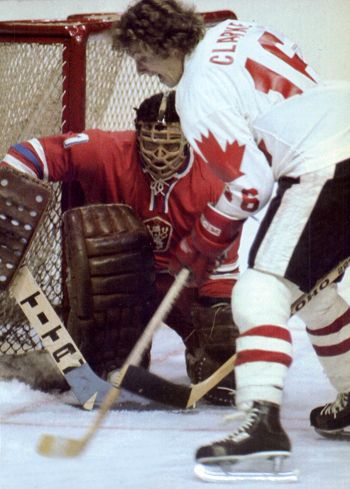
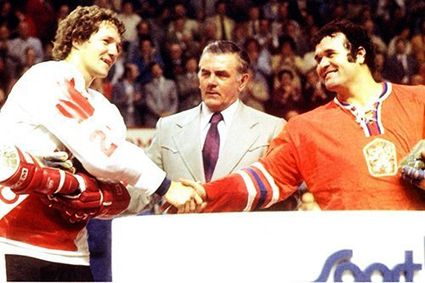
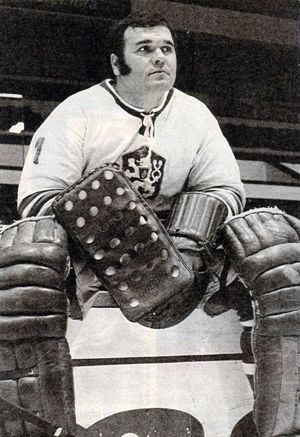
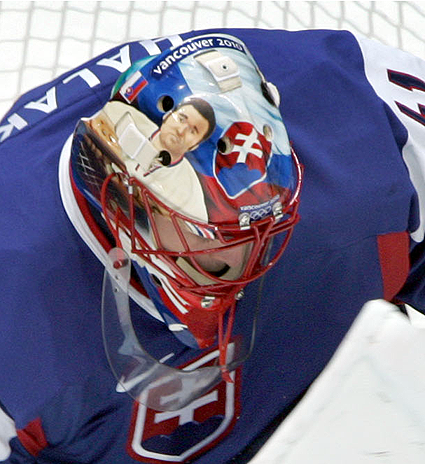
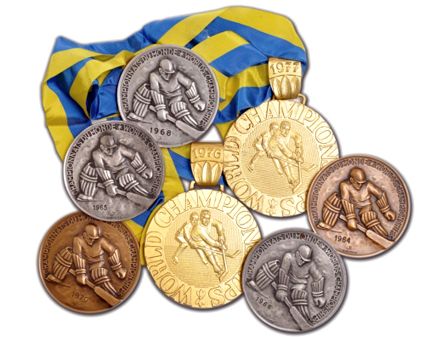
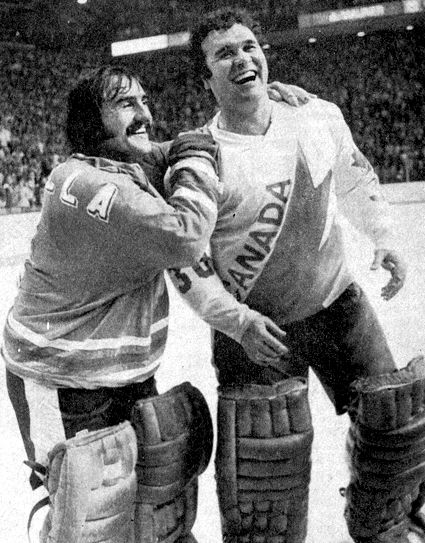










I wonder when was the last time in international hockey when two players swapped jerseys?
ReplyDeleteThe last time we can recall was the 1979 Challenge Cup when Slava Fetisov and Wayne Gretzky swapped heir captains jerseys.
ReplyDelete